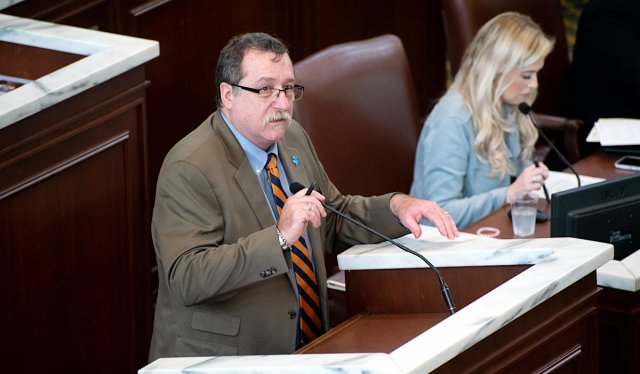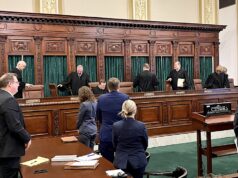

As leaders of the Oklahoma Legislature get close to concluding this year’s session by reaching a final budget agreement, a long-term initiative aimed at addressing the state’s teacher shortage appears poised to be the top school-related component of what is expected to be an overall increase in education appropriations between $80 million and $90 million.
About $17 million of that money would be appropriated for the State Regents for Higher Education to implement HB 3564, which proposes creating the Oklahoma Future Teacher Scholarship and Employment Incentive Program. The bill is currently working through the conference committee process, meaning its final language is being determined by a small group of lawmakers. Both chambers will have to vote on the final version.
Prospective educators who would enter the proposed teacher scholarship incentive program must graduate from an Oklahoma high school and attend an in-state college or university, majoring in education. As the proposal stands, they would receive $1,000 scholarships for each of their first three years of college and a $2,500 scholarship for the fourth year of college. After graduating and taking a teaching job in Oklahoma, participants would receive $4,000 at the end of each contract year, for up to five years.
“Basically, you’re getting $25,500. But we’re just not giving it to you on the front end,” said bill co-author Rep. Mark McBride (R-Moore). “You’re going to have to go to school, get a degree and teach in Oklahoma for five years.”
The program has a price tag of about $41 million over the next five years and is expected to receive an initial Fiscal Year 2023 allocation of about $17.4 million. Senate Appropriations and Budget Chairman Roger Thompson (R-Okemah) said trying to address the teacher shortage has been a “major part” of the Legislature’s conversations regarding education this session.
“I think the two-step program is very important, not only for teacher retention, but to encourage people to get involved in the educational field,” Thompson said.
McBride, who serves as chairman of the House Appropriations and Budget Subcommittee on Education, authored HB 3564 with Sen. Dewayne Pemberton (R-Muskogee). McBride said the bill and program have been well received as a possible solution to the teacher shortage in the state.
“Everybody loves it,” McBride said. “From higher (education) to common (education), all the different groups think this is a possible answer.”
‘I need teachers’

How the broader education world in Oklahoma views lawmakers’ FY 2023 budget remains to be seen. Lawmakers have said they are close to finalizing the entire agreement, and they must do so by Friday, May 27. With the 2022 primary election looming June 28, many legislators would like to conclude session even earlier and get back to their districts to campaign.
When the topic of education arises on doorsteps, however, it appears legislators will have to brag about the new future teacher incentive program and other higher education investments instead of a pay hike for current educators. Although more money for common education administrative functions could be part of this year’s budget, pay raises for existing educators appear unlikely.
“The state of Oklahoma is not doing enough to retain our very best and brightest teachers,” Sen. Carri Hicks (D-OKC) said in a press conference Thursday. “What we’ve seen is really a lack of awareness that things are going to be dangerous in August. I already know that just because I have so many friends who are still in the classroom, and many of them are leaving. (…) I’m very concerned about he quality of our teaching force moving forward.”
In an April 21 press conference, Senate President Pro Tempore Greg Treat (R-OKC) said he believes “reform and investment are both needed” in Oklahoma’s education sector. His SB 1647, which proposed “empowerment accounts” for certain families to spend public money on private schools, failed to advance earlier in the year. Treat has said he still wants movement on school choice this legislative session, but he also said the state “can’t ever take our foot off the pedal” in terms of funding for public schools.
“We can’t ever land on the aircraft carrier there and declare victory. It’s an ever-evolving situation and ever-evolving needs,” Treat said. “We’ve got to make sure we stay competitive regionally for the longterm. You can’t go a decade or so between paying attention to that, so we are very focused on it.”
Early signs, however, indicate that the Legislature may have prioritized higher education funding over common education finances this session. HB 3564, which creates the new teacher scholarship incentive program, is one of the few proposals that touches both levels of the education landscape.
McBride said although recent legislative sessions have yielded significant investments in teacher pay and school funding — putting Oklahoma in the middle of regional averages — those actions have not successfully addressed the teacher shortage.
“There are three things we need to do,” McBride said. “We need to graduate more teachers, we need for teachers to feel a little more appreciated, and it would be nice if we could retain some of the teachers that are retiring.”
McBride attempted to push other pay-based proposals this year. He authored HB 3565, which aimed to provide certified public school teachers with a one-time bonus of $1,000. However, the measure failed to advance to a floor vote. McBride co-authored HB 3072 with Rep. Toni Hasenbeck (R-Elgin), which would have provided annual bonuses for teachers with National Board certification. That bill also stalled.
McBride said he started working on his proposed new teacher scholarship incentive program over the summer after a conversation with the superintendent of Moore Public Schools.
“I asked him what he needed, and he said, ‘I don’t need any more money. I need teachers,'” McBride recalled.
McBride said he met with the State Regents for Higher Education, which had an existing incentive program, the Teacher Shortage Employment Incentive Program, strictly for math and science teachers. But McBride said the program is not really being utilized to its full potential, so he told regents he wanted to open it up to anybody who wants to go into teaching.
“I don’t care if you want to be a band director, English teacher, social studies (teacher), kindergarten (teacher). I don’t care what you want to be,” McBride said. “If you’re going to teach in Oklahoma, we’re going to open this scholarship up to you. You don’t have to be the best and the brightest, or whatever. This is for everybody.”
While budget negotiations seem to have lined up more money for higher education, McBride said common education will still be receiving additional funding next year.
“There’s new money. Part of it is this (teacher scholarship incentive), and there were some other requests that were needed that we tried to address with higher ed,” McBride said. “We’ve still given more money than last year to common ed. There was some money they needed for administrative costs. That was some of the money. It wasn’t the whole enchilada.”
The total FY 2023 budget request from the Oklahoma State Department of Education, approved by the State Board of Education in September, was for about about $3.26 billion, which would be an increase of about $96 million.
Last year’s education appropriations were the largest in state history, with lawmakers approving an agreement that increased the common education budget by about $171 million, which restored part of the 2.5 percent budget cut to education in 2020, when pandemic uncertainty and negative petroleum prices resulted in across-the-board cuts.
‘Open doors to expand the teacher pool’

Oklahoma, elementary school. (Elizabeth Sims)
Another bill aimed at combating the state’s teacher shortage was signed into law Friday by Gov. Kevin Stitt.
Authored by Rep. Danny Sterling (R-Tecumseh) and Pemberton, HB 3658 removes the requirement that teacher candidates pass the general education portion of the teacher competency exam, also called the Oklahoma General Education Test or OGET.
To become a certified as a teacher in Oklahoma, prospective educators must pass the OGET, Oklahoma Subject Area Test and the Oklahoma Professional Teaching Examination.
State Superintendent of Public Instruction Joy Hofmeister released a statement praising HB 3658 on Friday afternoon, calling the OGET exam “useless.”
“There are many hurdles in our state that have continued to deepen the teacher shortage. The OGET was one of those,” Hofmeister said. “This legislation will open doors to expand the teacher pool, ultimately making our schools better. I am grateful to the bill’s authors, Rep. Danny Sterling and Sen. Dewayne Pemberton, for recognizing the desperate need to knock down this useless exam and ease the teacher shortage in Oklahoma.”




















